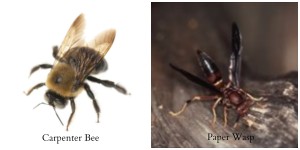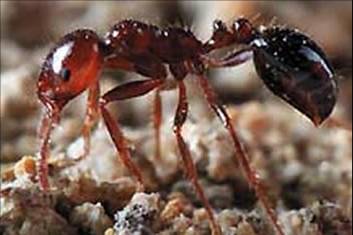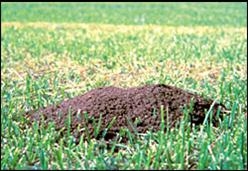READY TO GET STARTED?
REQUEST A FREE ESTIMATE
Fill out the form below or call (888) 466-7849 for a free, no-obligation estimate.
By: Katherine King
“Busy as a bee” is an old saying. The phrase implies that you are constantly moving, being industrious, getting your work done, and focused in order to achieve a goal. Now let’s think about the insect in the phrase, the bee. Bees are very industrious little animals. They are constantly in search of places to get nectar, their food, which they can bring back to the colony in order to feed everyone else. The bees that remain inside the hive are busy working as well. They are expanding the size of the hive, caring for young, and producing the honey which is their main food source.
All of these things are wonderful to hear about, but not many people are comfortable when they see bees. They can be rather large, bright colored, loud, and have a reputation to sting. These factors may make you wary of bees and may make you think that you need to make a run for it. In actuality, bees would much rather leave you alone. They only sting as an absolute last resort. They can only sting one time in their life and then die shortly after they sting you.
There are some redeeming qualities and benefits of bees…their honey. Honey does not have an expiration date. If your honey hardens, you can gently heat it and it will soften back up. If you ever get a burn, you can put honey on it to protect the burn and help it heal. Honey has other medicinal properties that aren’t confirmed, but from a holistic stand-point they are great. I have personally had good results using honey to try and fight some major allergies. If that is why you are eating honey, be sure you buy local honey from your area so that you are exposed to the right pollens.
Although bees have positive benefits, we want to make sure you know that they can also be a threat if caution is not exercised. If you have bees in or around your property and would like them removed, call our Wildlife division at Northwest Exterminating for our bee removal service.
Bees and wasps are often confused for one another. Although they both belong to the hymenoptera order and share similar features, they are different. Below is a list of basic shared features, as well as a list of features that set them apart from one another.

Pictures courtesy of NPMA
Bees AND Wasps
Bees
Wasps
For bee and wasp removal, call our team at Northwest Exterminating!
No-see-um’s, hop-alongs, beach fleas, biting midge, punky…these are just a few of the “cute” names that sand fleas go by! But cute they’re not! And they are very present in the low country area of Savannah, GA!
Sand Fleas reside on the beach and in other sandy areas during warm weather, double in numbers during the spring, produce a loud whine when in groups, and feed early in the morning and late at night. Sand flea bites may feel like a sting because they are very deep causing welts and lesions with severe pain and itching. The female bites for the blood protein needed for her egg laying, however this saliva can trigger your body to react and the bites can cause infections and fever viruses. Sand Fleas tend to “feed” on people with paler skin, as the skin is thinner making it easier to pierce.
To help keep these fleas at bay, try using an insect repellant similar to those used against mosquitoes. If you are bitten, do not scratch the welts, as scratching can cause swelling, itchiness, skin redness, and can lead to sand fleas burying themselves underneath the skin allowing them to continue feeding on blood. For bite relief, you can take a pain killer such as ibuprofen gels. Seek medical advice should the pain or itchiness worsen.
Barry Teubert
Northwest Exterminating
Savannah Service Center Manager
[email protected]
A wasp sting can potentially be very dangerous to those in your home, including yourself, your children, and even your pets. If allergic, a sting can cause severe complications, and even death. Even for those that aren’t allergic, a wasp sting is painful and can cause itchiness and infection at the site of the sting.
Needless to say, if there is a wasp nest around your home it is very important that you get rid of it. Since nests are usually home to a colony of wasps they can be dangerous to try to remove by yourself. We suggest calling a professional exterminating company, like Northwest Exterminating, to remove the wasp for you, especially if you have an allergy to stings.
You can purchase a can of wasp remover at your local hardware store. For best results and safety, read and follow all directions on the label. Most labels will tell you that nighttime is the best time to treat because the wasps will either be inside the nest or on the nest. Make sure that you have an “exit” plan for when the wasps come out of their nest. You don’t want to have to run through their swarm to get back inside your home. Wearing protective clothing (long sleeves and pants, gloves, hat, safety goggles, and mask) spray directly into the nest. Once you have sprayed for the amount of time suggested on the can, leave the area immediately. Most products will advise you to wait a specified amount of time before visiting the area of the nest. Once activity around the nest has seized, knock down the nest and dispose of the nest in a covered trash can outside of the home.
We strongly recommend that you contact Northwest Exterminating, or your professional exterminating company, to remove a wasp nest if you:
Where is the strangest place you’ve seen a wasp nest around your home?
 Fire ants are a common problem for homeowners in Atlanta and other southeastern cities. They can be found in the yard and should be a concern for homeowners. Fire ants can be difficult to get rid of once they have moved onto your property and have built their colonies. They are an aggressive species and will bite and sting if they feel that they, or their colony, is being threatened. A fire ant’s bite or sting can be painful and cause serious health risks to you, your family, and pets. You and your family should be able to enjoy your yard freely without the concern of stumbling across a fire ant mound.
Fire ants are a common problem for homeowners in Atlanta and other southeastern cities. They can be found in the yard and should be a concern for homeowners. Fire ants can be difficult to get rid of once they have moved onto your property and have built their colonies. They are an aggressive species and will bite and sting if they feel that they, or their colony, is being threatened. A fire ant’s bite or sting can be painful and cause serious health risks to you, your family, and pets. You and your family should be able to enjoy your yard freely without the concern of stumbling across a fire ant mound.
 Because fire ants can be difficult to get rid of and carry a health risk, Northwest Exterminating recommends using a professional exterminating company to ensure the fire ant colonies are treated effectively. Northwest Exterminating’s Fire Ant Control program reduces fire ant colonies within 24 to 72 hours. Our treatment even targets the colonies located underground. Other products used by companies take up to 30 days to control fire ants, require immediate irrigation to work, can be harmful to your family and pets, and may require over 80 pounds of product to be effective.
Because fire ants can be difficult to get rid of and carry a health risk, Northwest Exterminating recommends using a professional exterminating company to ensure the fire ant colonies are treated effectively. Northwest Exterminating’s Fire Ant Control program reduces fire ant colonies within 24 to 72 hours. Our treatment even targets the colonies located underground. Other products used by companies take up to 30 days to control fire ants, require immediate irrigation to work, can be harmful to your family and pets, and may require over 80 pounds of product to be effective.
In the summer, you don’t have 30 days to spare to enjoy your yard!
Benefits of Northwest Exterminating’s Fire Ant Control Service:
Have you had a run-in with a fire ant mound?